Conductor / Composer Harold Bauer
A Conversation with Bruce Duffie
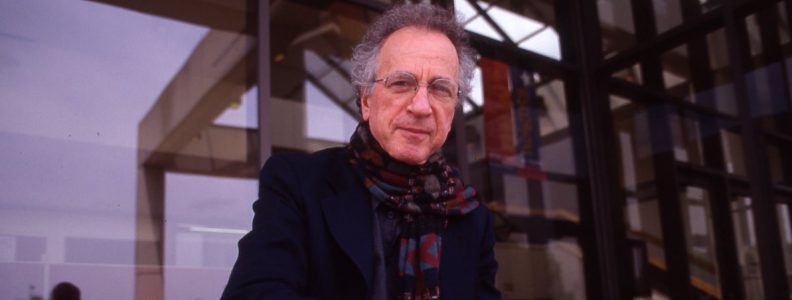
On the first day of February, 1997, Harold Bauer came to WNIB, and we
taped an interview. Parts were used to promote an upcoming production
by the DuPage Opera Theatre in Glen Ellyn, Illinois (24 miles west of downtown
Chicago). We also spoke in more depth about this work, and about his
other ideas and activities. Our full conversation is included on
this webpage . . . . .
Harold Bauer: I’ve been at the College of DuPage
for the past twenty years. This is the twentieth season, and I still
tend to speak in terms of seasons rather than academic years.
Bruce Duffie: That’s the musician in you!
[Both laugh]
Bauer: The New Philharmonic was started in 1977.
BD: By you?
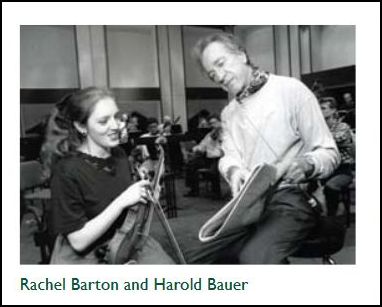 Bauer: By me, yes. I was hired by the College of
DuPage to be on the music faculty, but the primary mission was to begin
an orchestra program of professional caliber, and also an opera company.
We also began things for student participation. The New Philharmonic
was born after extensive auditions. It started out as a chamber orchestra,
and our first concert was twenty-six musicians.
Bauer: By me, yes. I was hired by the College of
DuPage to be on the music faculty, but the primary mission was to begin
an orchestra program of professional caliber, and also an opera company.
We also began things for student participation. The New Philharmonic
was born after extensive auditions. It started out as a chamber orchestra,
and our first concert was twenty-six musicians.
BD: Do they also play for the DuPage Opera Theatre?
Bauer: They are the pit orchestra, yes, and it’s
been a fabulous experience.
BD: You’ve been Music Director elsewhere, too?
Bauer: Yes, I have been Music Director of five
other orchestras. My first job was with the Lake Forest Symphony.
Victor Aitay [concertmaster
of the Chicago Symphony] took over when I departed for Peoria, Illinois.
I was Music Director of the Peoria Symphony for six years, and concurrently
conductor of the Quincy Symphony for four of those years. Then I
moved to Erie, Pennsylvania, where I conducted the Erie Philharmonic for
three years (1974-76). Then I came back to this area, and became
affiliated with the College of DuPage. My first professional position
began in 1962, so I feel very fortunate to have been able to live a life
as a conductor all this time.
BD: You did some composing as well?
Bauer: Yes, early on, and continuing. Composition
has been a very important part of my life, and there’s always a desire
to do more. But I felt the pressure of making a decision early on,
and composition took a back seat. But once you’re involved in something
like that, you never rid yourself of it. It’s always there, and
I’m always thinking of things.
BD: Throughout the years of conducting, has it
been a little better for you, having put certain notes in certain places
on a piece of music paper?
Bauer: Oh, absolutely! There’s no question
that being involved as a composer has been a very strong influence in the
way I approach a score. It’s also been a very strong motivating factor
in wanting to perform new music. I’ve always performed new music,
and championed certain composers.
BD: Now, here at the DuPage Opera Theatre, you
are going to combine your talents of composing and conducting?
Bauer: Yes! In 1963 I wrote a one-act opera,
Lazarus. It was in a very different phase of my life, and
I would hate to think I haven’t changed since then. It’s a very demanding
work. I’m not sure I would have the nerve to write anything so difficult
today, but it’s one of those early children that has remained very much
in my mind through the years. It was performed in 1965, when I was
the Music Director of the Community Music Association in Lake Forest. It
was quite successful, as I recall. It was very exciting, and a proud
moment for me.
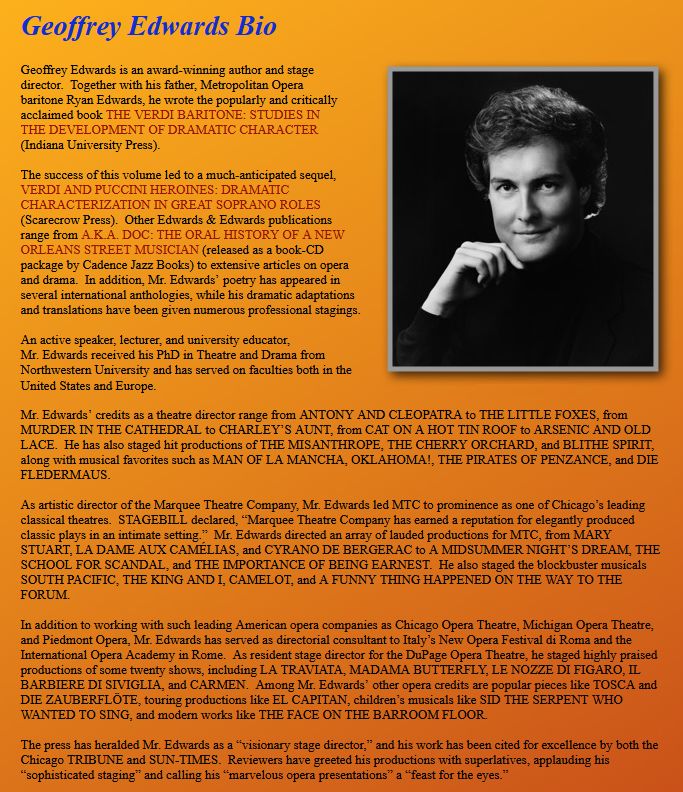
BD: I wonder if
someone who was in the audience then will be in the audience now?
Bauer: Yes. As a matter of fact, I hope
one of the original singers will come out to hear the performance.
It was also performed two years later by the Cambridge Opera Workshop,
and apparently it was very well received. Then it was retired, as
it were. It’s very difficult to get an opera performed. It’s
monumentally difficult.
BD: How did you decide to bring it back now?
Bauer: I’ve been thinking about it for a number
of years, and simultaneously thinking that it’s really time to do Gianni
Schicchi. I’ve done a lot of Puccini, naturally. Any opera
conductor loves to do Puccini, and I’ve been looking for place to do it.
I didn’t want to get into the whole Trittico, but I was looking
for some venue to do Gianni Schicchi with something else, and one day
the thought occurred to me
— what
about Lazarus? So, I got the score out. One has to be rather
cautious about approaching something that does go back so long.
BD: Did it surprise you when you opened the score?
Bauer: It surprised me that it was so difficult.
I would write quite differently today. I’ve lived with it for quite
some time now, because I wanted to make sure that it was still a statement
that I could believe in. I played it on the piano, and tried to
sing things in my own broken way, and I came to the conclusion that it
was still a very valid statement. I resisted the temptation to
make changes. I’ve only added a very few things just to thicken
the orchestra in a few places, and to help the singers grab the pitch.
But I decided to really go easy on the changes, because otherwise it becomes
a different work, and rather than re-work a whole one-act opera, I’d rather
just write another one.
BD: What’s the running time?
Bauer: It’s about fifty minutes, just under an
hour.
BD: That makes it a nice companion to Gianni
Schicchi.
Bauer: It does. As a matter of fact, it
makes a rather short evening because Gianni Schicchi is only about
forty-five or fifty minutes. So, with an intermission, it makes a
nice evening.
BD: Two full operas?
Bauer: That’s right, two full operas, and two
very contrasting operas. I do feel that Gianni Schicchi is
one of the great gems in the repertoire.
BD: Is it intimidating for you to cast singers
to sing your own opera? It’s easy to cast Gianni Schicchi...
Bauer: [Interrupting] It’s not so easy
to cast Gianni Schicchi, but I know what you mean. We have
a wonderful Schicchi, David Holloway. You probably don’t know the
name, but he is a very interesting baritone who had has twenty-five plus
years of career as a leading baritone in the major opera houses of the world.
In the U.S., he has sung at the Met, at the Lyric here in Chicago, at
San Francisco, at Dallas. For twelve years, he was a leading baritone
at the Deutsche Opera am Rhein in Düsseldorf. Then, he came
back to this country with his wife, Deborah, just a few years ago. I
met him through my wife, who had asked him to teach for her at North Park
College. She needed someone to teach voice, and David thought it over
and decided to do it. He is wonderful. It's a voice in the full
peak of its maturity. [For more about Holloway, click HERE.]
BD: What are the dates of the performances?
Bauer: February 13th and 15th (1997), Thursday
night and Saturday night at 8pm, and Sunday afternoon, February 16th at
3pm. A lot of people simply haven’t realized yet that the Arts Center
at the College of DuPage is a wonderful place for opera. It has
an eight-hundred-seat auditorium with a deep pit. There is also
plenty of free parking. It’s an easy drive
from anywhere in the Chicago area, and is very accessible from the expressways.
It’s just a great place for opera, and a very good place for symphony.
We’re very happy, very pleased to have such a facility, and we have excellent
designers. Our costume person, Joanne Witzkowski has done a superb
job on many productions for us, and so we’re feeling very good about it.
It’ll be a fine evening. Geoffrey Edwards, who is resident stage
director for the company, has brought his usual wonderful touches to the
production. I think it’ll be a good evening!
* * *
* *
BD: Let’s come back to the difficulties of casting
people in your opera.
Bauer: It takes good musicians, of course, people
who are very secure rhythmically, and who are not afraid to approach
new music. I don’t have to tell you that Chicago is a very talent-rich
metropolitan area, so there’s an enormous amount of talent around here,
and, fortunately, lots of people who are dying to sing opera. So,
rather than the feeling of desperation of never being able to cast this,
it was really a question of making some careful decisions.
BD: Are you pleased with those decisions?
Bauer: I’m very pleased! There are so many
phases of learning a new score. First you have to get familiar with
it. You work through the rhythms, and then you begin working through
the pitches. At many of those early rehearsals, the singers are really
musical typewriters, punching out correct rhythms and correct notes. Sometimes
you go home thinking that it’s correct, but I don’t remember that it sounded
so tedious. Then, all of a sudden, they begin to get secure, and
then they start really singing. That’s when the music begins. In
those first couple of staging rehearsals, they forget everything musically,
but you know that is going to happen. It’s not because
they’re incompetent. It’s just when you start thinking about the
motions, you tend to forget a lot of the music. So, after two or three
of those rehearsals, we realized we needed to get back together again
and have just a plain music rehearsal. That happened this morning,
and it was very exciting. All of a sudden, it’s making music.
BD: In composing in the mid-’60s,
this was a time for using a very dissonant, angular style.
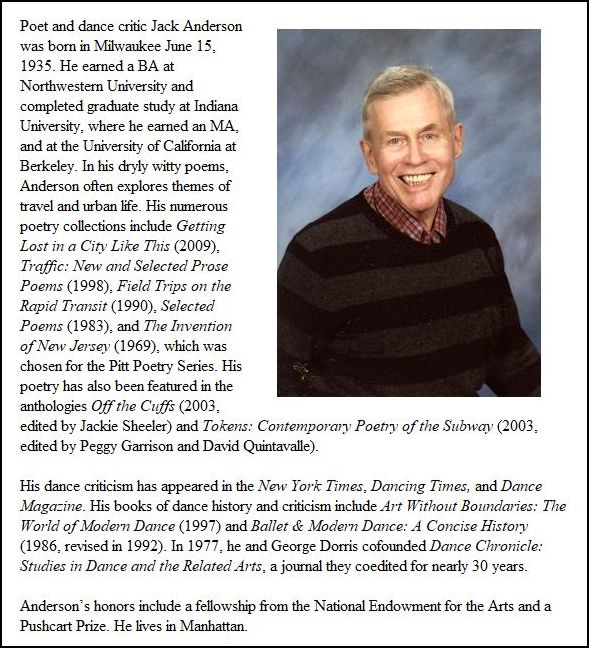 Bauer: An angular style, yes, although
I’ve always had a good feel for the vocal line. It’s an atonal opera,
but very vocal, very singable, and not harder than Wozzeck.
Bauer: An angular style, yes, although
I’ve always had a good feel for the vocal line. It’s an atonal opera,
but very vocal, very singable, and not harder than Wozzeck.
BD: How did the public react to it in 1965?
Bauer: They reacted very favorably. Of course,
they knew me, and that always makes a big difference. I was the conductor
and I was the Music Director of the organization. To really find
any semblance of ‘proof’,
a composer has to be away from home... although there’s nothing wrong with
being appreciated by people who know you personally.
BD: Would it have been better for you to let somebody
else conduct it?
Bauer: That may have been an interesting possibility.
Yes, I could have done that. I was gratified by the fact that the
production was also seen in Cambridge. I didn’t attend because something
came up and I was not able to go. It broke my heart.
BD: So, somebody else has conducted it?
Bauer: Yes, somebody else conducted it, and,
of course, the audience didn’t have a clue who Harold Bauer was. So,
there was no personal factor, and it was very successful. I must
say that the libretto itself is a very strong piece. Jack Anderson
wrote the libretto... not the political columnist, but the dance critic for
The New York Times. Jack is a poet, and I met him through a
friend. We introduced ourselves by letter... we didn’t have e-mail
in those days (!), and therefore I still have those letters. He had
carte blanche. I said I needed
less than a one-hour opera, and after several weeks he came up with the idea
of Lazarus, and the two sisters, Mary and Martha. One of them believes
in the miracle of Lazarus’s being raised from the dead, and the other doubts.
So, it’s a house of conflict. A stranger
— a pilgrim — comes
to the house to worship the risen Lazarus, and finds instead a household
divided between faith and doubt. Then Lazarus himself comes upon the
scene. He is just a haggard old man who speaks very monotone-like, and
is incapable of giving any assistance to someone who might want to believe
in the miracle. It’s just ‘believe as you please’, and this leads to
a very violent conclusion in which one sister feels compelled to find some
reinforcement for her belief, and the other sister finally persuades the
stranger to kill Lazarus, so that a kind of normality can be restored to
their life and to the world. He does that, and then leaves totally disillusioned.
BD: It’s not a happy ending
opera!
Bauer: It is not a happy ending opera.
The audience will be glad to know that Lazarus is first on the
program, so we’ll send them home whistling ‘O, mio babbino caro!’
after Gianni Schicchi. It had to be the opener. Believe
it or not, when Lazarus was premiered, we did Bastien und Bastienne
[a very early Mozart singspiel (arias with dialogue)] to open the
evening, and Lazarus concluded it.
BD: Depending on the amount of dialogue included,
Bastien is usually less than an hour.
Bauer: Yes, it’s fairly short. We have
excellent people this time, including Mark James Meyers as The Stranger,
and Andrew Schultze, who is well-known in the Chicago area, singing Lazarus.
Victoria Holland, who is a relative new-comer, is Mary,
and Sarah Holman, a wonderful mezzo who also teaches at Wheaton Conservatory,
is singing Martha. So, I have four really fine musicians, and a wonderfully
co-operative cast.
BD: Are you going to have enough rehearsal
time?
Bauer: [Laughs] ‘Enough
rehearsal time’ is somewhat of an oxymoron, but
I would say we can’t complain. One could always use a little more,
but... We haven’t met the orchestra yet, but yes, we’ll have enough
rehearsal time.
BD: Did you ever think about doing the Schubert
Lazarus (an unfinished oratorio) along with your Lazarus?
Bauer: I don’t know the work, but this would be the
year to do it. (Schubert was born in 1797).
* * * *
*
BD: How’s the New Philharmonic doing these days?
Bauer: The New Philharmonic is in a wonderful period
of maturation. This is their twentieth year, and in the last couple
of years many things have come together. There’s wonderful support
for it in the College. Being under the umbrella of the College of
DuPage is an extraordinary relationship. It is most unusual that a
community junior college should have that sort of posture when it comes to
supporting the arts. We have five professional organizations
— an opera company, a symphony orchestra, a jazz
ensemble, a theater company, and a choral group called the New Classic Singers,
all of which are under the College’s umbrella. We have tons of student
activity as well, but these five professional groups are housed in a beautiful
arts center.
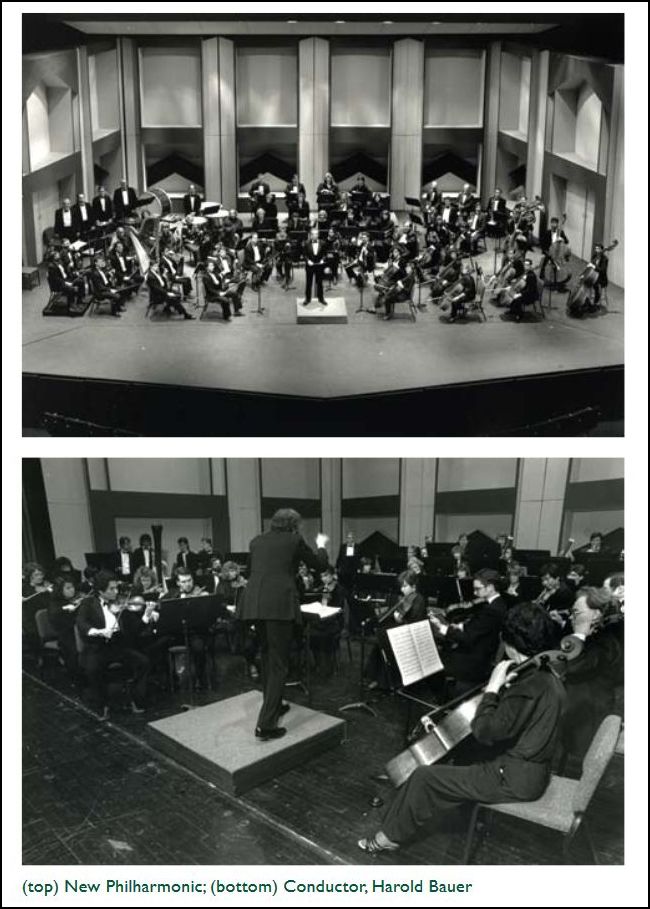 BD: How old is the arts center?
BD: How old is the arts center?
Bauer: This is the tenth anniversary year, and it
has been an incredible boon to that whole area. There are three performance
spaces — a theater that seats 200,
a sort of black box area that seats 75 or a 100, and the 800-seat main
stage. There’s many a night when all three are going, and we even have
people walking up to the ticket office who ask what’s playing that night.
They can choose between a Shakespeare play, a symphony orchestra concert,
or a modern dance recital!
BD: Sounds like an embarrassment of riches!
Bauer: It’s very encouraging. I went to
Northwestern, and lived in Evanston for many years, and the Western suburbs
seemed like sort of a wasteland out there. But that’s such nonsense!
BD: They’ve grown in the last years...
Bauer: Yes, they have of course, but there’s
a vital climate out there.
BD: Is it good to be able to bring classical
music to people who don’t generally come downtown for concerts?
Bauer: It’s terrific, and for better or for worse,
that’s what people need. If somebody comes up to me asking if they
should come and hear the New Philharmonic, or go and hear the Chicago
Symphony Orchestra, as much as I would like their business, I would tell
them to go and hear the Chicago Symphony Orchestra! [With a grin]
It is a better orchestra than the New Philharmonic, believe it or
not!
BD: [Pointing out the obvious] You should
tell them to hear both!
Bauer: [Laughs] Yes, but the fact is that a lot
of people just don’t do it. They don’t go downtown. It’s hard
enough for me to get to the Chicago Symphony and Lyric Opera. We
try to go as often as we can, but it’s not nearly
enough. So, it’s great to have quality in the suburbs. The
North Shore has it, and the West suburbs have it, too. The New Philharmonic
is a fine orchestra. I’m very proud of it, and very proud to be part
of it. And, of course, the musical diet varies. It’s a different
challenge. We did La Bohème, we did La Rondine,
and we’ve done Jenůfa [Janáček]. Some of those operas
are not familiar even to regular concert-going audiences. I would
say it’s fair to assume that if you come to a production of La Rondine
at DuPage Opera Theatre, probably ninety-eight percent of the people are
seeing it for the first time. Certainly that’s true of Jenůfa.
BD: Are there many who are seeing their very
first opera?
Bauer: Many of them are seeing their first opera,
too. Maybe not as many, but maybe it’s their
first opera in English, and they love it. We forget that there’s
always a new generation. There are always people who are seeing their
first opera, and television has helped a lot. People watch operas
on television, [with a grin] but it ain’t the same, you know! There’s
nothing like being there live, and seeing the passion played out right
in front of your eyes. It’s very exciting to be involved in opera.
Also, there are so many young singers here in the area that are just dying
to sing.
BD: What advice do you have for the young singer
who wants to make a career?
Bauer: That’s a tough one. Each person
has to decide what kind of risks they’re going to take, what kind of accommodations
and compromises they will put up with. Even the ‘successful
singer’ has a hard time of it. You can sing,
say, three or four leading roles in a season, and it doesn’t necessarily
mean you’re going to be able to make a living. Or, if you do make
a living, you might not have time with your family, or you might not be
able to have a family, or live with your loved ones, or whatever the case
may be. But if the fire is in your belly, you’ll pursue it. I
find it very difficult to ever say to anyone that a career is not for them,
because that’s a little bit too Godly. Some very unlikely candidates
have made very exciting careers.
BD: Have there been some who should have made
careers who haven’t?
Bauer: Oh, I’m sure. I shouldn’t say all
this just for a singer, but certainly it’s so important for a singer to
have time to have leisure, to have rest, to be able to nurture the voice,
to learn the repertoire, to learn the style. I can think of several
people right now that should be sponsored for two or three years.
They don’t have to live lavishly, but be kept on some sort of stipend where
they can afford to work on their technique.
BD: They have to be able to live and not have
to have a day-job?
Bauer: That’s right, and certainly not a night-job
where you wait tables until Midnight, and the next day have lessons and
rehearsals.
BD: They need to concentrate only on the music?
Bauer: That’s so important. It’s important
for a violinist, too, but the instrument isn’t as fragile. It’s not
quite as complicated as with the singer, because the voice is a part of
the body.
BD: If you smash a violin, you can get a new
violin. If you smash the voice, it’s done.
Bauer: That’s right. You have to take care of
that voice, and you have to build it properly. I hear people frequently
say that there are still opportunities in some of the European countries....
BD: [With a gentle nudge] ‘Operatunities’???
Bauer: [Laughs] Yes, ‘operatunities’ to
do more singing, and to get the repertoire. It’s difficult in this
country.
* * * *
*
BD: Are you going back to composing?
Bauer: Yes! There are several people
who have asked me to write things. You met my friend John Bavicchi,
who is a composer. He’s always writing. I’ve never
seen him when he’s not working on something.
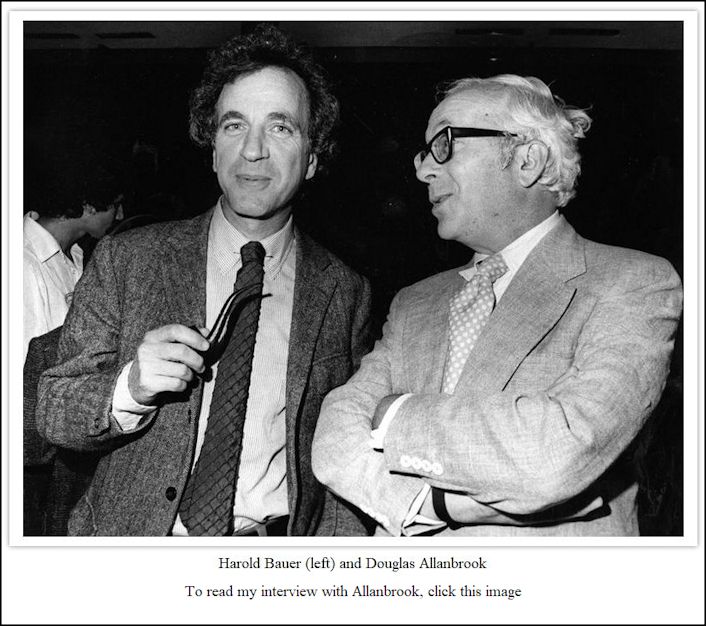 BD: I interviewed him, and I’ve done shows of his music.
BD: I interviewed him, and I’ve done shows of his music.
Bauer: We just did a piece of John’s recently,
and for some years John has asked me to write a piece for his group out
in Boston. I have to do that because it’s just very much a part of
me.
BD: Let me ask you a real easy question.
What’s the purpose of music?
Bauer: [Laughs] Yes, that’s an easy one,
isn’t it??? I don’t know what the purpose of it is. I know
I couldn’t live without it. I only know that it’s enrichment.
Does that boil down to a purpose? I wouldn’t be able to say.
BD: Are you optimistic about the future of music?
Bauer: No, I’m not.
BD: [Surprised] Are we talking composition
or performance?
Bauer: We’re talking about the whole scene.
It’s very hard to know where it’s heading with the whole marketing thing,
and the whole idea of popularization.
BD: Do you feel it’s going to become trash, or
do you feel it’s going to become lost?
Bauer: A little bit of both. I really don’t
know, but I don’t want to sit here and sound like a pessimist, or someone
who was born in the wrong year. I have lived in a wonderful period
of development, roughly from 1960 to the present day. That’s a long
span (almost forty years), but music education has essentially gone from
our school system. We’re reaping now our first generations of children
— and teachers! —
who have grown up with no musical training, no musical background.
It’s very hard just to be a serious musician, and not be a marketing analyst.
How do we meld pops and jazz with symphonic? I don’t see that
they need to be melded, but maybe I’m wrong. Opera certainly seems
to have a growing audience. The success of the Lyric Opera, for example,
is phenomenal, and encouraging. Supertitles have meant a great deal.
The fact that people are really understanding what they’re hearing
is an encouraging sign.
BD: Does that make you feel better or worse about
doing opera in English?
Bauer: I’ve always done opera in English.
I wouldn’t consider doing it in any other way.
BD: You wouldn’t do it in Italian with titles?
Bauer: I would prefer not to. There’s definitely
something lost. I can’t imagine that there was ever a composer in history
that would have imagined, or wanted their opera in a language foreign
to the audience. As a matter of fact, we have many examples of just
the opposite, of musical changes which were made for the translations.
It probably would have boggled their minds to think that such a thing
would even exist because, after all, it is drama in music. Who would
go to see Shakespeare in German, yet my father and mother, who grew up in
Germany and Austria, always thought Shakespeare sounded so strange in English!
On the other hand, given the situation today with the top singers of the
world jetting around to all these cities, of course the operas have to be
done in the original languages. But for me, there’s nothing like the
experience of hearing an audience respond to their own language, so I wouldn’t
have it any other way. The titles are very problematic. For the
most part, singers hate it because they hear these audience responses at
the wrong places. Maybe that can be fixed...
BD: The ones who sing comic operas tell me they
get two laughs — one when the audience
reads it, one when they sing it.
Bauer: Exactly. The hall that we have is
very intimate — which should be
— and that’s the best way to do it. It’s
wonderful to hear the audience involvement.
BD: Despite all of the ups and downs, are you at the
point in your career that you want to be?
Bauer: I’m grateful to be where I am. It’s
what I’ve wanted. Maybe at a certain point I envisioned other
things, but I’ve had a great run, and am very happy.
BD: Thank you for all the music, and for the conversation.
Bauer: It’s a pleasure to speak with
you.
========
========
========
---- ---- ----
======== ========
========
© 1997 Bruce Duffie
This conversation was recorded in the studios of WNIB, Classical 97
in Chicago on February 1, 1997. Portions were broadcast one week later.
This transcription was made in 2021, and
posted on this website at that time. My
thanks to British soprano Una Barry for her
help in preparing this website presentation.
To see a full list (with links) of interviews which have been transcribed
and posted on this
website, click here.
To read my thoughts on editing these interviews for print, as
well as a few other interesting observations, click here.
* * * *
*
Award -
winning broadcaster
Bruce Duffie was with WNIB, Classical
97 in Chicago from 1975 until
its final moment as a classical station in
February of 2001. His interviews have also appeared
in various magazines and journals since 1980, and
he now continues his broadcast series on WNUR-FM, as
well as on Contemporary
Classical Internet Radio.
You are invited to
visit his website for
more information about his work, including
selected transcripts of other interviews, plus
a full list
of his guests. He would also like to call your attention
to the photos and information about his grandfather,
who was a pioneer in the automotive field more than a century ago.
You may also send him E-Mail with comments,
questions and suggestions.


 Bauer: By me, yes. I was hired by the College of
DuPage to be on the music faculty, but the primary mission was to begin
an orchestra program of professional caliber, and also an opera company.
We also began things for student participation. The New Philharmonic
was born after extensive auditions. It started out as a chamber orchestra,
and our first concert was twenty-six musicians.
Bauer: By me, yes. I was hired by the College of
DuPage to be on the music faculty, but the primary mission was to begin
an orchestra program of professional caliber, and also an opera company.
We also began things for student participation. The New Philharmonic
was born after extensive auditions. It started out as a chamber orchestra,
and our first concert was twenty-six musicians.
 Bauer: An angular style, yes, although
I’ve always had a good feel for the vocal line. It’s an atonal opera,
but very vocal, very singable, and not harder than Wozzeck.
Bauer: An angular style, yes, although
I’ve always had a good feel for the vocal line. It’s an atonal opera,
but very vocal, very singable, and not harder than Wozzeck. BD: How old is the arts center?
BD: How old is the arts center? BD: I interviewed him, and I’ve done shows of his music.
BD: I interviewed him, and I’ve done shows of his music.